Magic Mirror at Sziget Festival 2024: ‘the LGBTQ community still has a power’
Exclusive: "Maybe they want us to be silent, but we are shouting and we are shouting beautiful things and we are showing beautiful things to the world," its organisers tell Attitude.
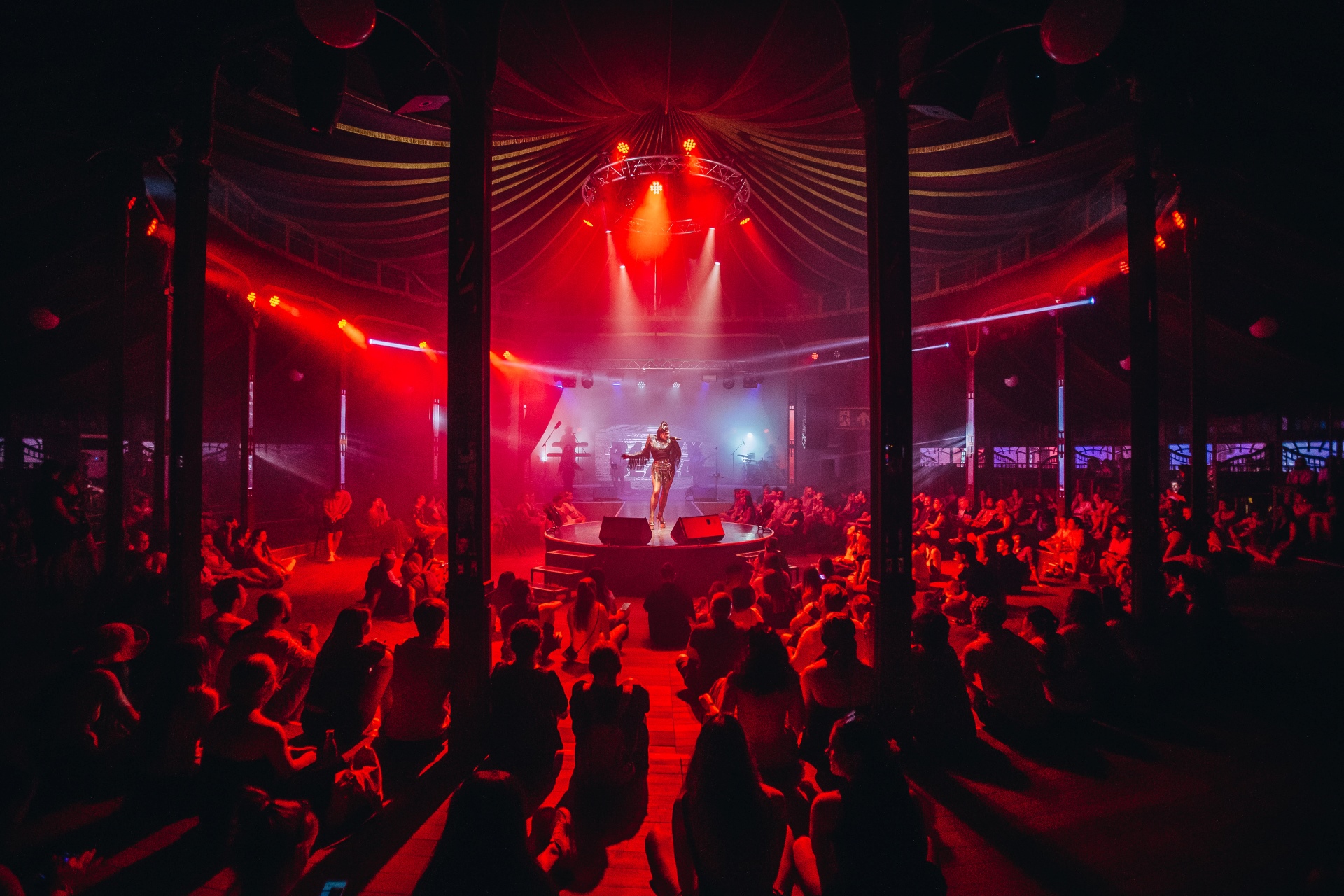
Budapest’s Sziget Festival, set on a small island in the Danube River, plays home to one of Europe’s largest music and cultural festivals, boasting over 1000 shows across 60 stages for 6 days straight – a far cry from its humble beginnings as a small student gathering back in 1993. Fast forward to 2024, though, and we were excited to be heading over to the ‘Island of Freedom’ with the hundreds of thousands of other festival-goers to bask in all the sun, Langos and music that the Hungarian capital had to offer.
While the main body of programming at Sziget was peppered with an incredible array of queer artists and icons across multiple genres, such as the Princess of Pop herself, Kylie Minogue, the US’ Janelle Monae, Halsey and Yves Tumor, as well as our very own Attitude cover star, Becky Hill, and the multi-award winning Sam Smith, we were most looking forward to breaking away from the crowds and screens of the main stages to discover the island’s dedicated LGBTQ+ oasis which has been nurtured for the last 22 years; Magic Mirror.
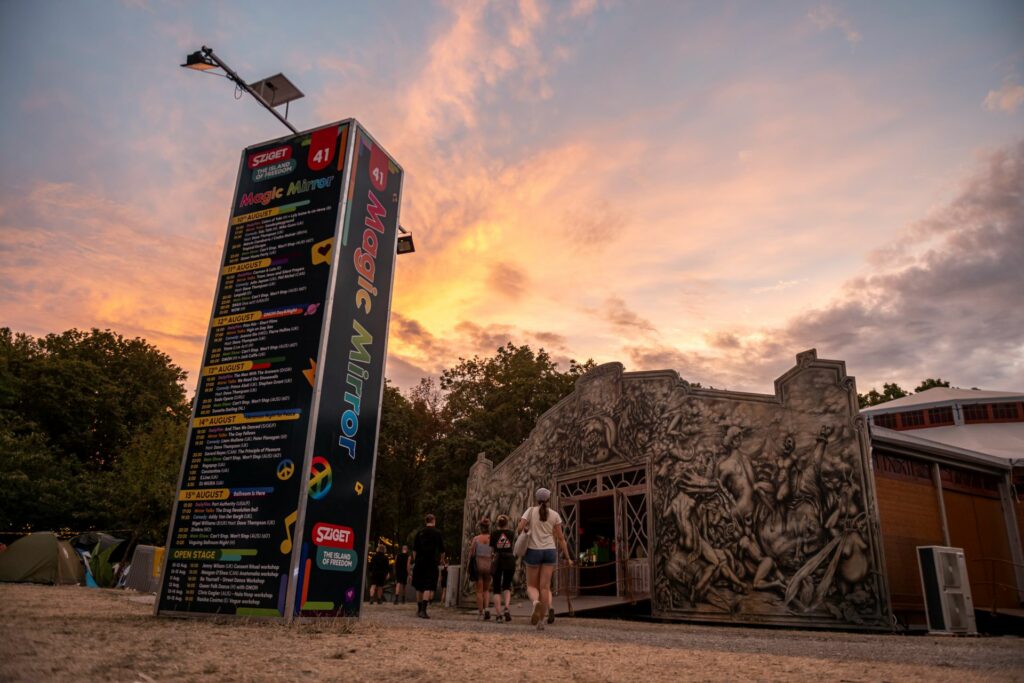
Set in a beautiful wooden spiegeltent with luxurious interiors and stained-glass windows, Magic Mirror sits seemingly untouched by the shiny brand activations and neon corporate sponsorship that is highly visible across the rest of the site. It boasts a vast programme of performance art, comedy, film, dance and drag, not to mention the wildest of all-hours parties. This year the stage featured a six-night residency from Drag Race UK winner Danny Beard and their band, and an all-night-long cabaret party from Drags of Anarchy, as well as daytime activities ranging from vogue workshops and stand-up comedy to designated taboo-free panel talks series, Mirror Talks, where important topics such as sex, porn, drugs, and social media, are discussed. The space possesses the air of an independent, underground club platforming the very best and rawest talent.
Sziget Festival was founded in 1993 to give young people in Hungary, after the fall of the Iron Curtain, the opportunity to meet and feel the power of a free and open community. Although liberal democracy was still taking shape in Hungary at that time, the young people of Sziget created a ‘model republic’ where full respect for personal freedom, acceptance of diversity, peaceful cooperation, and coexistence of different cultures and people were natural for everyone.
But what makes this space incredibly special and vital, even, is the fact that it sits against a backdrop of the country’s conservative politics, where same sex marriage is banned, equal rights are restricted, the legal recognition of trans individuals has been ended, and where LGBTQ+ content for under-18s is illegal. Since its inception, Magic Mirror has embodied the tenacity of the LGBTQIA+ community in the face of adversity, providing a safe, celebratory space to focus on visibility and to challenge Hungary’s traditional attitudes through a joyous program of queer arts and stories.
Amid the hustle, bustle, feathers and glitter of backstage, we managed to find time for a quick chat with Magic Mirror Program and Venue Manager György Ujvári Pintér, and LGBTQ journalist and host of Mirror Talks Ádám András Kanicsár, to get a little more insider info about Magic Mirror.
For those who may not know about Magic Mirror, can you tell us about the stage and why a space like this is so important?
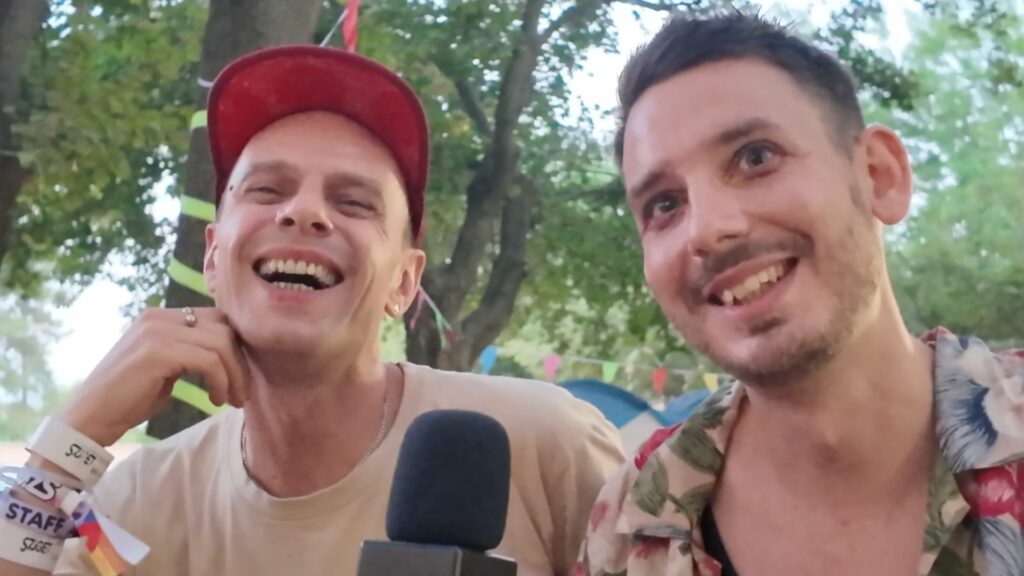
György Ujvári Pintér: The idea was born in the beginning of 2000s for fighting for acceptance and tolerance, which was a very important topic, of course, in central Europe, and over the years it has become even more important. That’s what is really stunning, that over the years its actuality remained. It is very important for us to speak to all kinds of people belonging to the communities and also their friends. So, it’s like, to help understand also that majoritarian society in what we are different and in what we are absolutely not different, but also to give home to all the parts of the of the community. So in the programming, which is plural disciplinary, we always try to speak to all kinds of people who feel connected to the LGBTQIA+.
Ádám András Kanicsár: I guess it’s really important to have this tent because it really shows that the queer people and the LGBTQ community still has a power. We still have the power of creativity, of production, of talking, of raising questions, of trying to answer all these questions. So, we are still working. We are still here, and it’s really important in the middle of Europe now that we show ourselves and we show the world that it’s a diverse world, it’s not a black and white world, and I guess it’s also important to communicate to LGBTQ people, and to show that there are still some places where for one week all the magic happens. All the queer magic happens, all the queer power just centralised into one point, and this point just really, is just the most magical thing at Sziget Festival and, I guess, for the whole year in Hungary.
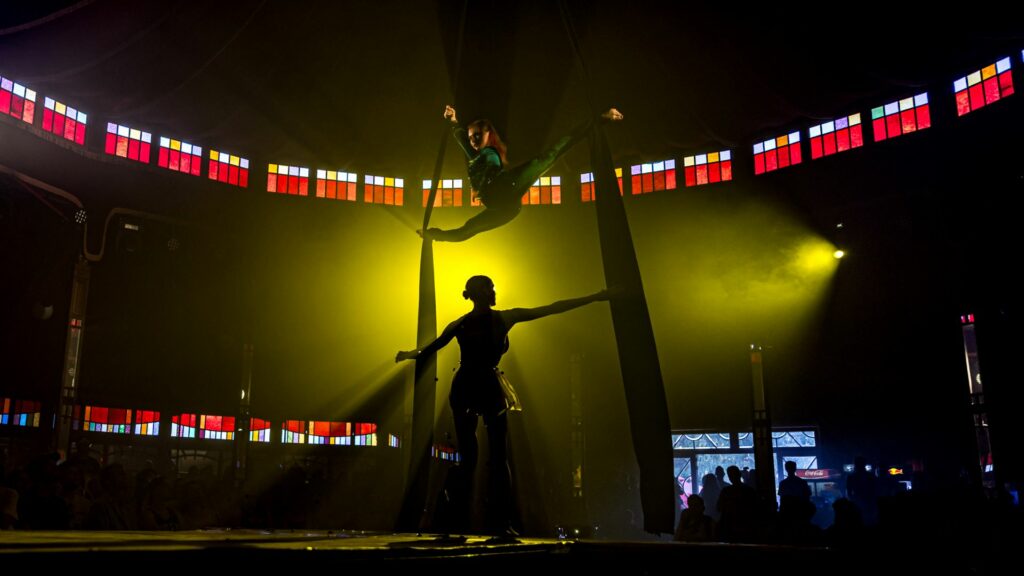
György: Also speaking about society I think that more and more queer people try to find new models of how to relate to each other and to the world, and this is a great spot to show these kinds of approaches or these kind of tendencies or fights for change in society and the relation between people. It’s also very important, I think. The Mirror Talks, which is which is held by Adam as a programme, it’s a very important point for that, where we can speak about new ways of relating to the world.
Ádám: And it’s also a safe place. To have a safe place in Hungary is a really important thing. So, I guess if any queer person comes to Sziget and finds this place, find all the colours of the queer community, it’s the safest place of all, and to and to have it in Sziget, it’s a big responsibility that we always take care of gladly with the biggest happiness ever.
Do you hope that – or have you seen where – Magic Mirror has influenced any other mainstream festivals in regard to nurturing safe queer stages and talent?
György: We don’t exactly know what influences what. It’s also the society that can influence major festivals for example, to open an LGBT space, or maybe the Magic Mirror can also influence them. So, it’s very hard to say where the motivation comes from. But I’m really glad that we are pioneers in that. The Magic Mirror has been existing for 22 years now, the festival for 30 years so, I think that it’s a really great thing that here, in central Europe and in Hungary, that has become a very conservative country in the last 22 years, and which was not as conservative politically before, we can have a space where, you know, that it can come from a country where there is a real reason for fighting for tolerance. And this is a little paradoxical, but it shows how much our world is paradoxical as well.
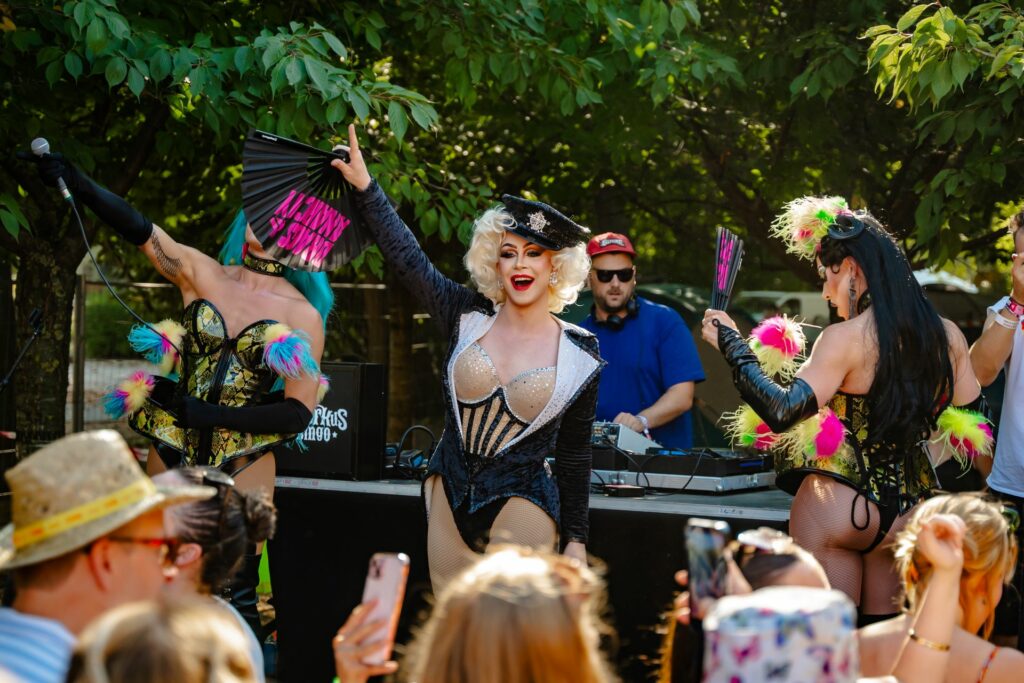
Ádám: But I guess it’s surely inspirational. I mean, in Hungary, the government really wants the queer people to behave, to be silent, and we can see that in the whole of Europe it’s becoming more and more of the trend. Like, more people want queer people to be silent. But here we are not silent. Maybe they want us to be silent, but we are shouting and we are shouting beautiful things and we are showing beautiful things to the world, and I really hope that it’s inspirational for anybody, not just for other festivals, but for the performers also, so that they can knock on any door and they can say that, ‘If there is a festival or if there’s any kind of show, I want to show myself because I know that there’s a place for me, I want to show my magic to other places as well, because I know I can be successful. I know I can be accepted in any kind of place.’
You also said something very beautiful at the end of one of your talks, Adam, about the importance of protecting children, particularly as a community. Did you also say that Magic Mirror here is the only 18+ stage on site?
György: It’s not an 18-plus stage, but it’s true that for respecting Hungarian laws, even though we don’t fully agree with those laws, for respecting them for certain kinds of programmes where we speak openly about homosexuality or transgender issues, we have to put the 18 signs, but it’s only two programmes where we have to put it and none of the artistic programmes and none of the clubbing programmes have to have that sign, over 18 years old.
Ádám: It’s also a trend in Europe, and not just in Europe but in the whole world, that there’s a state of mind that queer people are dangerous for children because they want to turn these children into transgender person, into gay person. And in all these talks, which is really funny because it’s never planned that we’re going to talk about children’s rights and we’re never going to talk about child protection, but at the end of the point of every Mirror Talks, we start to talk about children, we start to talk about how we can make this world a better place for children, not just for the queer ones or who is going to be part of the queer community, but for every child, because we have a huge responsibility as straight people, as queer people, as any kind of people, to build a new world, which is a more open world, because if the world is more open, if the world is more diverse, everybody will feel at home in this world.
And to end on a positive note, what have been your most joyous moments of Magic Mirror? It can be this year or any year previous!
György: Well, for this year it’s still very hard to say, but I think that the Magic Drag Brunch, for example, is a programme that is super interesting and really funny and on the other hand, socially very important as well. We started that programme last year with Queens Brunch Vienna, and we continue this year and maybe next year as well. Also, I’m going to be very curious this year about Drags of Anarchy. There so many things. But let’s say the Magic Drag Brunch is something that can speak to many people at the same time, and it’s also entertaining, but also very artistic. So, I like this combination. But it’s not only about entertainment, but also something very, very progressive.
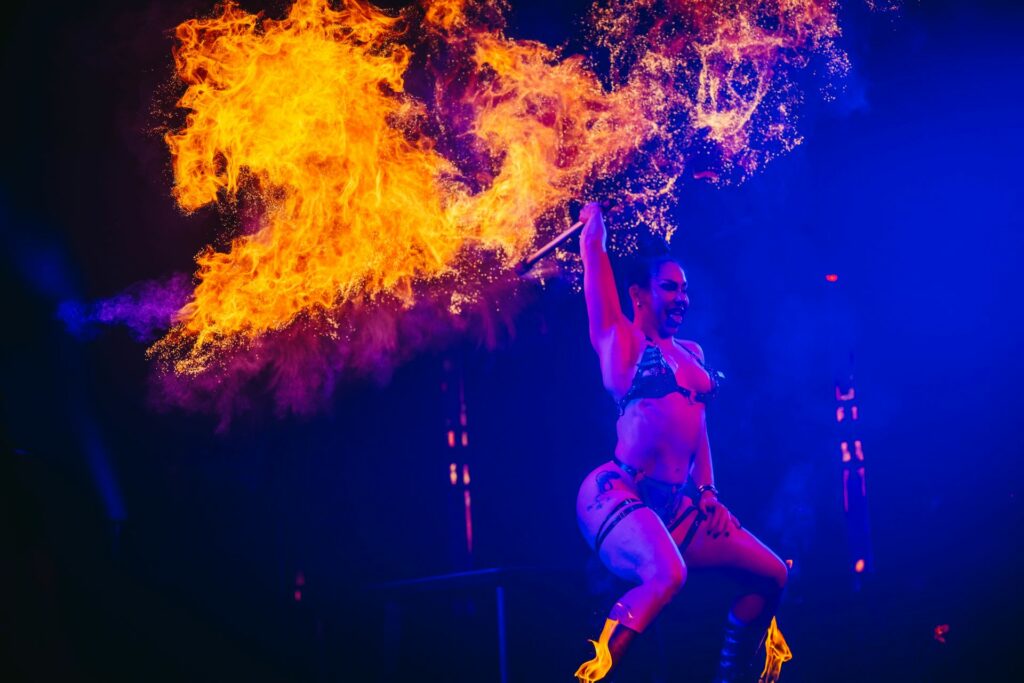
Ádám: I have a lot of good memories from Mirror Talks. It’s my third, fourth or fifth year of talks, I don’t remember! You know, it’s always the best memories that are always the small ones from Mirror Talks because I’m always watching the audience. I’m always watching how the audience reacts if we have to change a topic or if we have to stay on one topic. I’m always searching for the faces and I can see a lot of times that someone comes in from a whole different world who never heard of gay rights, never heard of queer problems, and they sit in, they think that it’s a silly talk, they think that it’s a laughable topic but they stay and you can see the change of their faces that they’re getting interested and, at the end of the talk, they start to raise questions also, and they totally figure out that these are serious problems, these are serious topics that we have to talk about and it’s their responsibility too. It’s everybody’s responsibility. So, seeing on stage that we can change people’s opinions during a festival between two concerts, between two parties, in a 60 minutes talks, it’s wonderful.
Super Early Bird tickets for Sziget Festival 2025 are available now by clicking here.
